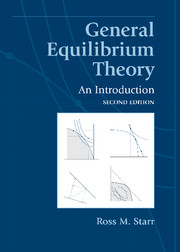Book contents
- Frontmatter
- Contents
- List of illustrations
- Introduction to the second edition
- Preface to the second edition
- Preface to the first edition
- Table of notation
- Table of assumptions
- A General equilibrium theory: Getting acquainted
- B Mathematics
- C An economy with bounded production technology and supply and demand functions
- D An economy with unbounded production technology and supply and demand functions
- E Welfare economics and the scope of markets
- F Bargaining and equilibrium: The core
- G An economy with supply and demand correspondences
- H Standing on the shoulders of giants
- Bibliography
- Index
H - Standing on the shoulders of giants
Published online by Cambridge University Press: 05 June 2012
- Frontmatter
- Contents
- List of illustrations
- Introduction to the second edition
- Preface to the second edition
- Preface to the first edition
- Table of notation
- Table of assumptions
- A General equilibrium theory: Getting acquainted
- B Mathematics
- C An economy with bounded production technology and supply and demand functions
- D An economy with unbounded production technology and supply and demand functions
- E Welfare economics and the scope of markets
- F Bargaining and equilibrium: The core
- G An economy with supply and demand correspondences
- H Standing on the shoulders of giants
- Bibliography
- Index
Summary
The material presented in Chapters 10–25 represents fulfillment of the research agenda in Arrow and Debreu (1954). It represents most of the state of the general equilibrium theory (for economies with a finite number of households) through the 1960s. The next steps in the analysis of the field have used rather more sophisticated mathematics to develop a more refined class of results. Some of those implications are briefly illustrated in Chapter 26. In addition, the computational approach has meant an applied aspect to the general equilibrium theory, an applicability that would have surprised readers of the original article, Arrow and Debreu (1954), when it appeared.
What have we learned? The mathematical method formalizing economic concepts is immensely powerful. It gives form and generality to economic ideas and specifies the scope and limits of their application. Chapter 27 puts the results in perspective.
- Type
- Chapter
- Information
- General Equilibrium TheoryAn Introduction, pp. 323 - 324Publisher: Cambridge University PressPrint publication year: 2011



